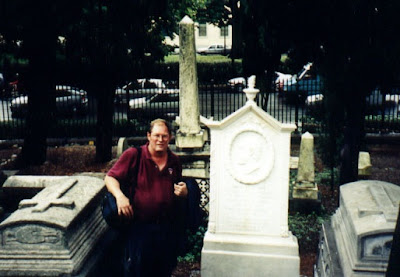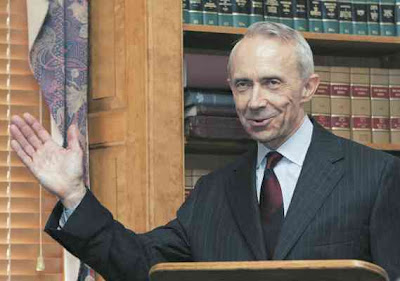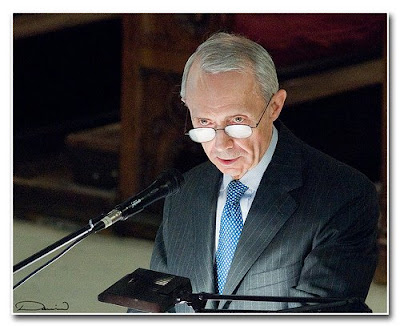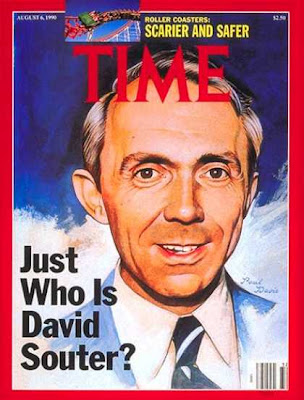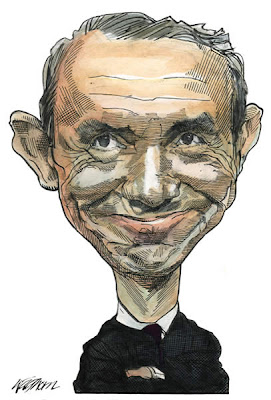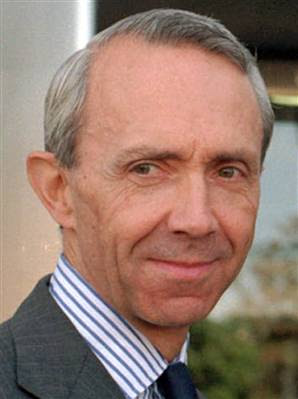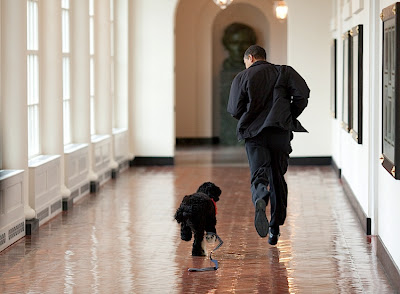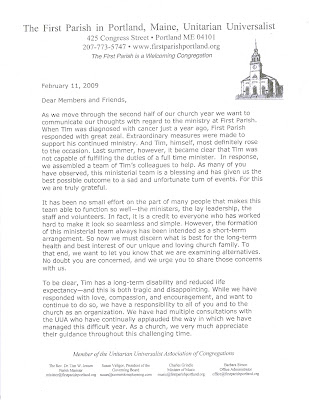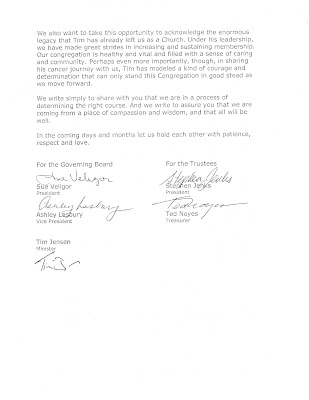a farewell sermon preached by the Rev. Dr. Tim W. Jensen
at the First Parish Church in Portland, Maine
Memorial Day Weekend, Sunday May 24, 2009
OPENING WORDS: “At the Un-National Monument Along the Canadian Border” by William Stafford
This is the field where the battle did not happen,
where the unknown soldier did not die.
This is the field where grass joined hands,
where no monument stands,
and the only heroic thing is the sky.
Birds fly here without any sound,
unfolding their wings across the open.
No people killed — or were killed — on this ground
hallowed by neglect and an air so tame
that people celebrate it by forgetting its name.
****
[Extemporaneous Introduction] -- I’ve been thinking for months (and in some ways maybe even decades) about what I wanted to say this morning in my last sermon from this high pulpit, but it wasn’t really until this past week that I figured out where to begin.
[details of Walter’s arrest]. My own reaction to all this was actually a lot easier than you might think. All I did was ask myself what I would do if it had been my brother Erik arrested in the alley behind my church after a 12 hour drinking binge, and then went forward from there.
But in many ways this situation with Walter is emblematic of my ministry here. This is the first time, in thirty years, that I have ever had occasion to visit one of my own people in jail, even though it is one of the duties specifically mentioned in the New Testament. My ministry to Walter is something that I’m not going to be able to finish before I leave here; maybe even something that I never should have taken on in the first place. Who’s to say?
But maybe this is also in some small way a part of what my own illness and my own disability are trying to teach: that it doesn’t really matter how capable you are, or how intelligent or talented, or even how organized and hard-working...there will ALWAYS be more than you can do alone, more than you can finish by yourself; and there are times, LOTS of times, when we just need to let go and turn it over to somebody else. Preachers and teachers come and go, but somehow the sermons keep on being preached, and the teaching endures; somebody new takes on the duties and the responsibility, picks up the work and carries it forward, often in directions we ourselves might never have dreamed of....
Back in 1984 the widely-respected church consultant Lyle Schaller published a book called
Looking in the Mirror: Self-Appraisal in the Local Church, which was widely-read within our denomination (as these things often are) during its brief season of popularity among us. Schaller was one of the first consultants (at least of my era) to talk about church culture as a function of congregational size. What we today would call the Family, Pastoral, Program and Corporate-sized churches, Schaller vividly labeled as “Cats, Collies, Gardens and Ranches,” emphasizing not only the very different styles of leadership appropriate to each of these vastly different congregational cultures, but also that the smaller two types of congregation (the Family-Cat and the Pastoral-Collie) really do function mostly as organisms, while the larger two (the Program-Garden and the Corporate-Ranch) are true organizations, and demand a very different kind of ministry.
Schaller’s main point though was that a church is NOT a business, and that religious institutions of all sizes can lead themselves deeply astray if they look too eagerly in that direction. In fact, Schaller was also one of the first (along with Peter Drucker) to notice the exact opposite trend in our society: that businesses are looking more and more to faith-based institutions to try to figure out how they can generate the kind of loyalty, devotion and faithfulness (both among their customers and their employees) that churches seem to take for granted.
And in a handful of pages buried just beyond the place where you were most likely to have stopped reading out of boredom, but not so far that you would notice if you skipped ahead to the end, Schaller presented an even more provocative idea which has stuck in my mind now for 25 years. Rather than looking to business for models, Schaller suggested that the military would be a better option, and then went on to list (mostly for skeptical clergy) 44 different parallels (Schaller is very fond of the number 44) 44 different parallels between ordained ministers and commissioned military officers which he believed were worthy of attention.
Among these were the fact that these are both seen as distinctive “offices” set aside from secular/civilian society, and marked by attendance at special schools and the tradition of a special commissioning or ordination ceremony (which includes the taking of an oath or vow); along with the use of special titles and rank, and special clothing reflecting that rank.
“In both vocations” Schaller noted, “the handicap of a comparatively low salary was offset by perquisites of office, womb-like care from entrance to death, the mutual support of the brotherhood, the feeling that one was responding to a calling rather than simply ‘making a living,’ a sense of service to the public and a pension following retirement.”
Likewise, both are professions where “the practitioner, at an early age, had many firsthand encounters with death” and where the mission comes first and the needs of the cause or the institution far outrank the preferences of the individual. And likewise both are deeply vulnerable to what Schaller called “the blight of ‘careerism,’ of placing the future career and well being of the individual ahead of the cause.”
Schaller’s observations had a great deal of impact on me 25 years ago, both because they were at once deeply insightful and well outside the box, but also because they connected so directly with the ancient archetypes of the hunter and the shaman, the warrior and the priest. It’s much more complicated than mere life and death, or the contrast between killing and healing, between violence and peace. There is also here a fundamental principle of leadership, around the necessity for leaders in effect to put their own lives on the line in order to bring the group together. The leader’s personal ambitions and desires, and at times in many ways even their personal safety, are all “sacrificed” for the success of the group. The soldier must learn to lead “from the front;” the preacher must teach “by both precept and example.” To do otherwise is to lead the mission to failure, to mislead the community into hypocrisy and shame.
The core mission of churches doesn’t really change that much from place to place or from generation to generation, or even from denomination to denomination. It begins, of course, with
Worship: a time of inspiration and devotion, solemn contemplation and community solidarity, during which the members of the congregation recommit themselves to the values, traditions, and prophetic vision of the church. This word “prophecy” can seem a little intimidating, but all it really means is “to speak for another” -- that is, to speak for God in behalf of the voiceless: the widows, the orphans, the strangers, the prisoners, and others on the margins of society who need someone to speak up for them.
Then there is the mission of
Education, a process by which spiritual wisdom and values are both learned and taught, and passed down from generation to generation. The mission of
Fellowship (in Greek,
koinonia) seems simple enough, but creating an authentic and shared common life by which People of Faith become a true “Faith Community” can be more complicated than it seems. Yet it begins with simplicity itself, and our natural human desire to be together. There’s an old Viking poem which the Unitarian Church in Denmark sometimes uses as a chalice lighting, and it goes like this:
Overvæld ingen med flotte gaver.
Små ting får ofte megen ros.
Med et brød til deling
og en kop sendt rundt
fandt jeg venskab.
[Overload no one with lavish gifts.
A small thing often finds much favor.
With a little sliced bread
and a cup shared ‘round
I found friendship.]
—From the Hávamál (Sayings of the Vikings)
[Submitted by the Danish Unitarian Church]
Hospitality likewise follows on in this same spirit: “open the windows and the doors, and receive whomsoever is sent” Yet hospitality alone is pretty lame without some form of effective
Outreach, or what more traditional churches might call “Evangelism” -- effective methods for proclaiming OUR Good News to all who are hungry to hear it. Effective
Pastoral Care returns us once again to the essential healing mission of the archetypal shaman.; in fact, the entire mission of the church might easily be summed up as taking people who are hurt and helping them become whole, then taking people who are whole and helping them become wise. And often it is as basic as simply showing up: what seminary professors call “the Ministry of Presence” -- showing up when others can’t or won’t as a reminder that God and a whole community of people who care are still out there even though you can’t see them, and eager to help you any way they can.
And then at last there is the mission of
Social Justice, and working to build a better world -- in essence, creating a taste of the Kingdom of God on Earth, where basic fairness is found (or perhaps created) at the balance point between accountability and compassion. “He has shown you, O Mortal One, what is good; and what does THE LORD require of you, but to do justly, and to love mercifully, and to walk humbly with your God?”
That’s the mission, more or less, and it’s pretty much the same wherever you go. But how we put this Mission into Practice here in THIS Time and THIS Place, with the people (and the resources) of this community, for the larger community out there, is entirely up for grabs. It’s a matter of context and execution: what are we prepared to do, and how effectively are we able to make it happen?
During my brief tenure here, and even beforehand, we at First Parish have essentially organized our understanding of Mission around three overlapping themes.
The first of these is that we are Portland’s
Original Faith Community, gathered in 1674. [There are several different dates for this floating around, depending on what you mean by “gathered” “organized” or “established” -- loved to have been the one to research all that, had “nature and nature’s God” been willing to grant me the time to do so]. I’ve always been attracted to this motto because it works two ways: yes, we were here first (and that is never going to change), but I also like to think that we are committed to being the most innovative, and thus the most “original” faith community as well, especially when it comes to finding new ways of expressing and promoting the fundamental wisdom and values of our liberal faith tradition, and passing them on to yet another generation of devoted Unitarians and Universalists.
The term “Heart(h)fire” is a concept that the leadership team of this congregation came up with at their annual retreat the year before I arrived here. Here’s the definition that was written at the time: “A source of positive energy, the heart(h)fire is fed, and as it grows, we get back warmth and light that spills beyond our borders and draws in those passing by.” It too is a wonderful image, and as I said two years ago when I first arrived here, the quality that makes it all possible is represented by that central letter “H” within the parentheses. That “H” stands for “Hospitality” -- for the willingness to open up our circle and invite those who have been attracted by the beacon of our fire to join us around the glowing hearth, and be warmed there alongside us, as we learn to share our lives with one another, heart to heart. But it can also represent Hope, Health, Honor and Honesty, and above all else, the simple willingness to be Helpful to neighbors and strangers alike.
And then finally there is the slogan I rode in on, “A Warm & Welcoming Place in the Heart of the City.” I like this turn of phrase for a variety of reasons, not the least of which is because it embodies yet another challenge I heard articulated within the first few weeks of my arriving here, the challenge of “becoming the kind of church people expect us to be.” Which brings us back again to the question of size, and the challenge of evolving from an aging yet still friendly, furry, and very frisky dog into a tranquil, productive, and sustainable garden. It’s perhaps the most difficult challenge a minister and a congregation can face, especially when the temptation is always there just to get another puppy.
But growing a congregation from a hundred or so regular worshipers to one where attendance is routinely in the 350-500 person range, along with all of the accompanying changes in staffing and governance, program offerings, even congregational culture itself, begins with a willingness simply to see things through different eyes, and the desire to continue to innovate, to continue to improve, while remaining grounded in the solid foundation that has sustained this congregation for centuries now.
It’s not so much about new ideas for new times, or a desire to change simply for the sake of change. Rather, it’s about the willingness to commit to the RIGHT ideas, and to practice and refine them until they become second nature. How do we best worship together? How do we enjoy one another’s company, and educate our children and newcomers to our faith? How do we reach out to strangers and invite them to be our neighbors; how do we take care of one another, while still working together to make the world a better place?
The answer, of course, is Leadership. Leadership, Leadership, and still more Leadership. The military seems to understand this in a way that the Church (or at least a liberal church like ours) perhaps never will. Of course, there is a world of difference between leading a platoon of 45 soldiers, and a company of 200. (not to mention a battalion of 600 or brigade of 3000), just as there are differences between ministering to family, pastoral, program and corporate-sized churches. But in the army, every third or fourth soldier is some kind of leader -- a squad leader or team leader, a sergeant or some other kind of non-commissioned officer who is responsible for training and leading their small unit of soldiers in the fulfillment of their mission.
Army training now, especially at this hands-on level, is oriented around the model of “Be*Know*Do.” And it really is just as simple as it sounds. Obviously, a leader needs to know what they are doing -- expertise is an important part of any job. And the ultimate measure of success is performance: can the team actually get the job done? But it begins with the character of the leaders themselves: who they are as human beings, and those inner qualities of courage, duty, loyalty and respect, honor, integrity and selfless service that we’ve been considering all morning.
If character is important in a military leader, it is even more essential in a religious leader, at every level from Committee Chair or Covenant Group facilitator to the Grand Dali Poobah of the UUA itself. And it begins not just with courage, but also profound humility, and deep gratitude for the great gift that is life itself. We learn to express this gratitude through generosity and service...not just as a spiritual discipline, but as a sign of our religious discipleship, our devotion and fidelity to the principles and values of our liberal faith tradition, and the important work it calls us to.
And so we too follow the Great Commandment to “love the Lord thy God with all thy heart (and all that other stuff), and love thy neighbor as thyself;” to “do unto others as you would have others do unto you,” and perhaps to “Judge not, lest ye be judged” just for good measure.
And then finally there is my message from two weeks ago: not so much a commandment as simply a reminder, that “Wir Alles sind Gotts Kinder” -- We are ALL God’s Children -- and thus brothers and sisters to one another, even when (as with our more traditional family siblings) we didn’t really ASK for them to be born, and we didn’t really get to choose them either, but we’re still stuck with them through ties of blood and DNA...just as we are, I suppose, with the whole human family of which we are a part.
[Extemporaneous Conclusion] First introduction to public speaking, sophomore in High School: “tell ‘em what you’re gonna tell ‘em, tell ‘em, tell ‘em what you told ‘em.” For two years it has been my honor and my privilege to serve as the minister of this parish, and the minister to the members of this congregation...who in so many ways have ministered to me far better than I was able to minister to all of you....
***
“May Thy whole truth be spoken here
Thy Gospel light forever shine
Thy perfect love cast out all fear
and human life become divine.”
[Our final hymn is number 35, “Unto Thy Temple, Lord, We Come”]

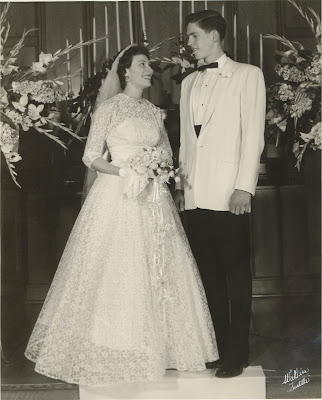

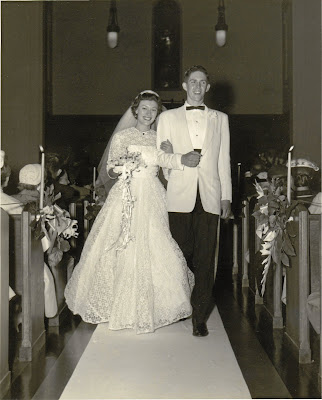

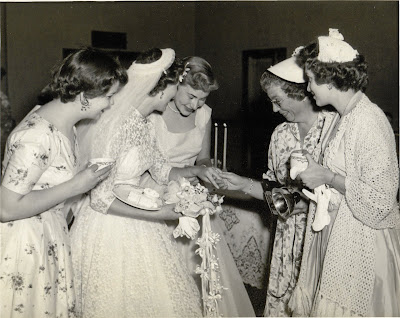




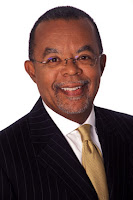

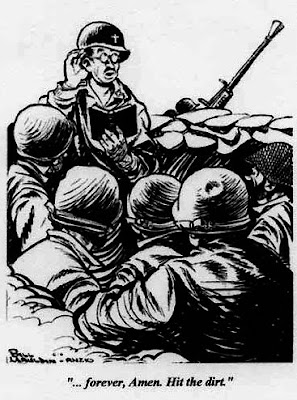







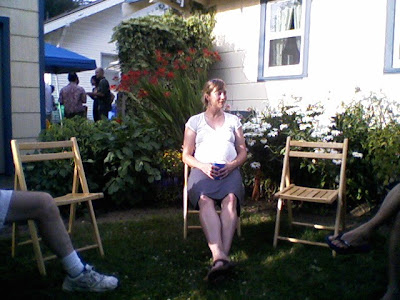
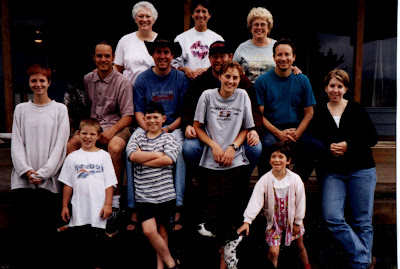.jpg)


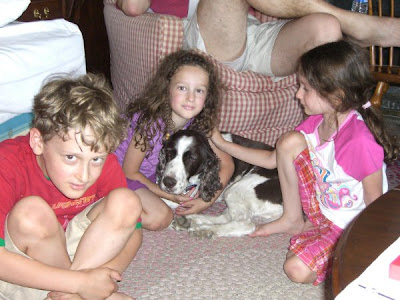


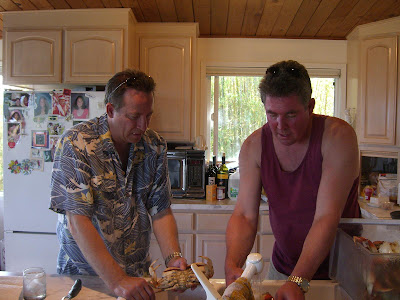
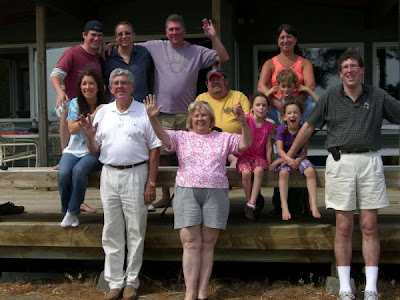

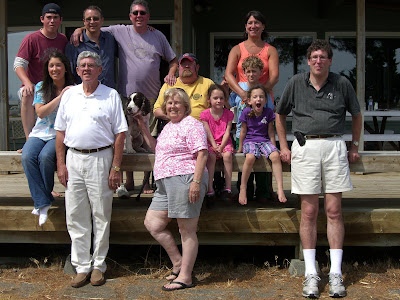


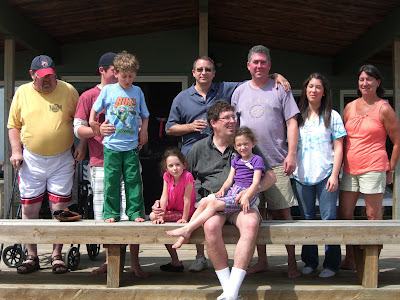
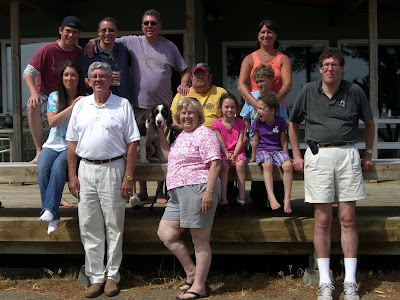+July+4+09+041.jpg)

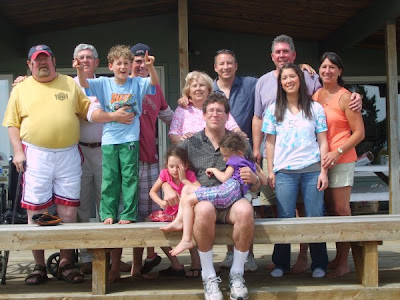

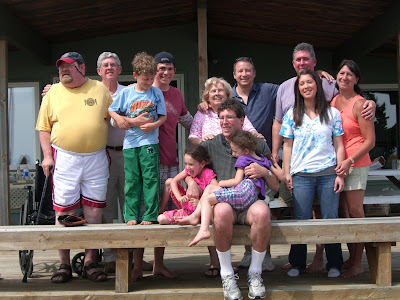
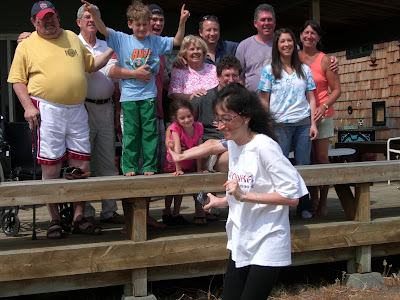%3DJuly+4+09+057.jpg)

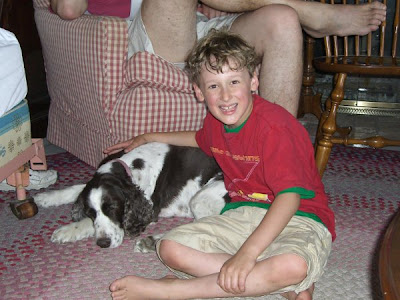

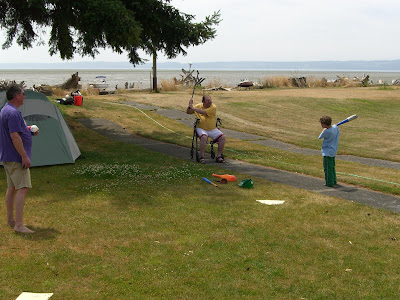
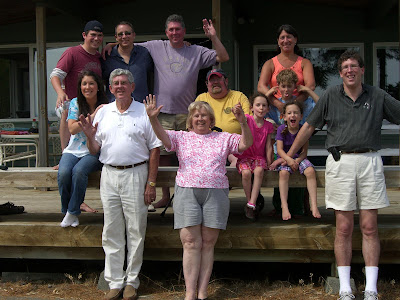







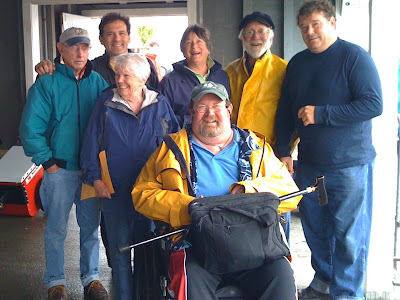




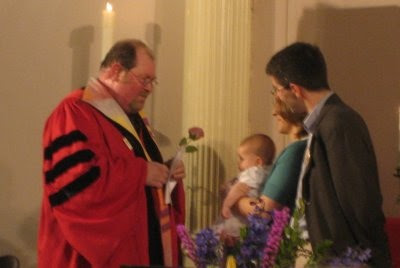




.jpg)

